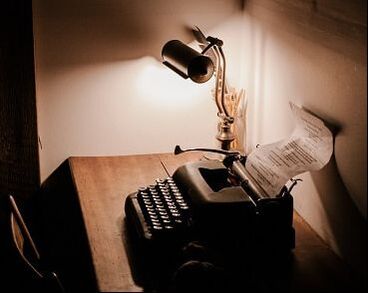 Maybe you're sitting around with friends and family and you're telling then how you sailed around Cape Horn in a 32 foot sailboat and the waves were towering over the mast and the rails were under water and you thought to yourself, 'This is it - I am not going to survive.' Your audience is riveted, hanging off every word as you describe the wildness of the seas and the shrieking banshee-wind, the heaving and pitching of the boat, the drenching sea-spray and rain, and all the while the sun was trying to break through the roiling black clouds above. Inevitably, someone will ask, 'Why don't you write a book about that sea voyage?' You shrug your shoulders, and say, 'Who would want to read about that?' A story about survival against the odds? Are you kidding? Of course they would! Now we don't all have such stories to tell, but we all have one: the story of our life, how we came into the world, what we did, and sometimes, how we're about to leave it. We're all curious about other people's lives. We like to read about the rich and famous and how they came to be that way; we like to know how people survived ordeals like being lost in a barren desert for a year or stranded on a blizzardy mountain top for a week. We want to know how people overcame traumas and challenges, like a diagnosis of cancer, the loss of a beloved parent, recovery from a serious life changing accident. And sometimes a life story isn't about such things. There is interest in the every day, how a life is lived, the joys, sorrows, happiness and sadness that walks alongside us each day. American writer May Sarton wrote about her life in her Journal of a Solitude, reflecting on the day to day over the course of one year (her 60th), and it is one of the most compelling and poignant insights into a woman who was intensely private, craved solitude and the beauty of nature, and yet was tormented by loneliness. So why write about your life? Think about publication if you have a story of personal challenge, success, failure, or adventure - why not aim high? If you don't want to publish your story, then write it just for family as a legacy for future generations - this is a valuable gift. Writing about your life can be 'good therapy', it can help you make sense of things you did or said or thought, why you chose the path you did, and in this way it's a private thing, writing you don't share with anyone. It's just for you. And remember: you don't have to try and tackle your entire life all at once. Take it in bits. Begin with one part of your life that springs to mind. It might be the year you spent in Africa on extended safari, experiencing the wild animals, or it could be just one day, the one where you went to the circus as a ten year old with Auntie Margie and Uncle Peter and the clowns terrified you and Uncle Peter snapped at you and said, 'Harden up kid!' Writing about your life is always worth it. It's never wasted effort. ... and if you need help getting started, contact me for a $25/45, guaranteed to kick-start that life writing idea.
0 Comments
 My writing mentor, Mrs. M, took no prisoners when it came to my excuses for not writing. This was a challenge for me as I was in high school at the time and had plenty of other things I wanted to do, like going out with friends, swimming at the beach, shopping ... having fun. So there were many times when I resented her being pushy, telling me that in order to write, you actually had to write (surprise surprise) and writing was a discipline. And of course in those early years I quite fancied myself as someone famous, dashing off a few devastatingly fabulous erudite and awe-inspiring lines here and there, making heaps of money and receiving endless adulation for my creative works that were admired by millions. I once told Mrs. M that I could only write when I felt moved to do so. And she laughed her head off and that was that. Mrs. M came at writing from the perspective of a newspaper journalist and indeed she was often writing articles and letters to the editor in her later years. To her, it was all about completing the work and to do that you actually had to sit down and do it, and then you had to be prepared to accept feedback, good and bad criticism, and rewrite and rewrite until that piece of writing shone brilliantly like a newly minted silver coin. Back then we didn't have computers and laptops so I typed up my work on my Mom's portable Remington typewriter. I would then submit my pieces of writing for her critique and they would come back to me scrawled over in red pen. I would go away and re-work it, bring it back, plenty of red pen but maybe less than the first time, and so it went on until that piece of writing was as good as it could possibly be, and then it went off to a newspaper or a magazine where it sometimes hit the mark, but most often, not. Sigh ... Mrs. M was trying to instill in me the discipline to write in order to actually produce something, and then the stoicism to weather the storms and challenges that inevitably come: the rewriting, the polishing, the sending off with such hope, the dashing of those hopes against the rocks, and then riding the crest of a wave when you have a success that feels like the best thing in the world. So writing is the right thing to do. Keep at it and don't give up. Those teenage years spent in the company of my mentor Mrs. M are almost a lifetime away from where I am now but I can still see her in my mind's eye with that red pen, hear her voice as she discussed the writing and the changes she was suggesting, encouraging me to go back and try again. When I last saw Mrs. M she was in a private hospital and very unwell. I spent just a few moments with her. It was hard because i knew I would not see her again. The last thing she said to me was, 'Write lots of books.' |
Archives
January 2024
|